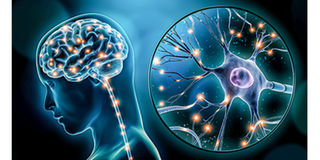Taking care of the brain: Your amazing superpower
Sponsored by Aga Khan University Institute for Human Development

By Dr Ronald Ngetich
What is the brain?
The brain is one of the most amazing parts of your body. It is a fascinating organ that controls everything you do. It helps you think, pay attention, remember things, solve problems, control your emotions, and more.
It is relatively small, with a size of approximately two clenched fists and a weight of about 1.3kg. Despite its small size, it uses a lot of energy – about 20 percent of the body’s energy needs. This is because it is always working, even when you are asleep.
What happens to the brain when you are asleep?
While sleeping and perhaps having a nice dream, your brain is still busy at work. The brain remains active and helps you organise your memories in a manner that can be stored and made easily accessible when required in the future. For example, when you want to remember where you kept your books. It is also during sleep time that the brain cleans out harmful toxins that can affect its functioning.
How does the brain work?
Your brain is made up of billions of tiny specialised cells called neurons. The neurons are located in the brain as well as in other body parts, including the spinal cord. Neurons send messages to each other through electrical signals similar to text messages between two people chatting using a phone. The neurons are very quick and can send information in a fraction of a second.
Now with this information in mind, consider a situation where you are cooking while having a conversation with your friend in the kitchen at your house. Your friend is seated on a stool or a chair next to a high shelf located in the kitchen. You stretch your hand to pick something from the shelf but mistakenly you push over items on the shelf and the only egg you were planning to cook falls off its tray on the shelf, heading directly to your seated friend’s head. Your neurons will send messages to each other; prompting you to shout at your friend to move. Alternatively, a signal could be sent that prompts you to jump and catch the egg before it hits your friend, thereby saving both the egg and your friend. By doing so, the brain is communicating with your body parts, including your hands, legs, and mouth, to initiate action.
How does our brain change as we grow?
Brain development starts before a baby is born (three weeks after conception) and continues for a long period, lasting approximately 30 years after birth. As the brain matures (as we approach 30 years), you also get to know more things, learn complex skills and think better.
The brain grows to four times its size during pre-school, reaching about 90 percent of the adult brain by the age of six.
During early childhood, the brain has numerous neurons (almost twice as many as the adult brain). However, as it develops, inactive neurons are cut off and the communication between active ones is made better and smoother. If more than necessary neurons are cut off, your brain may not develop and function properly.
Neurons can be made active through environmental exposure and stimulation. This could include exposure to language, music, play, and social interaction. Such stimulation is particularly important during the child’s first five years, which is a critical period of human development. As you age and reach around 30 to 40 years, the brain starts to shrink. Your performance also starts to decrease and becomes even worse as you grow older and with unhealthy lifestyles. Therefore, we should take good care of our brain by exercising and embracing a healthy lifestyle so that we can perform better for longer.
What can happen if the brain is not working as it should?
Many things can go wrong if your brain is not working well. First, your performance in tasks that require memory, problem-solving, and attention, among others, will be decreased. Additionally, you may not be able to regulate your emotions well, and thus, develop emotion-related mental health problems such as depression and anxiety. It is, therefore, important to take good care of your brain.
How can you take care of your brain?
Taking care of your brain involves adopting healthy practices, including:
- Exercising, especially aerobic exercise (any activity that makes your heart beat faster and breath heavier) improves blood supply to the brain and thus, promotes your memory, thinking, and mood, among other benefits.
- Eating healthy foods rich in vitamins and essential minerals such as leafy vegetables, nuts, and fish.
- Wearing a helmet when riding a bike or skating prevents you from hurting or injuring your brain.
- Sleeping well enables your brain to appropriately regulate your mood, enhance memory and develop in a healthy manner.
- Avoiding alcohol and drugs such as tobacco that negatively affect the health of the brain by killing its cells or affecting its supply of oxygenated blood, among others.
- Engaging your brain by doing challenging tasks such as completing puzzles, memory games, reading, singing, and painting.
By adopting these practices, your brain will stay healthy and you will reap long-term benefits.
____________________
Dr Ronald Ngetich is a Neuroscience Researcher at the Institute for Human Development, The Aga Khan University